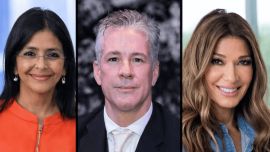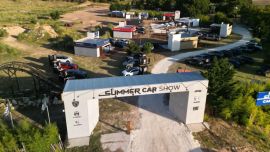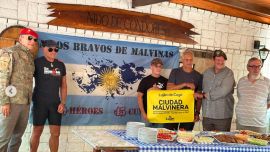Pope Francis denounced the use of violence in the struggle for indigenous rights Wednesday, while celebrating Mass in a restive region of Chile hours after assailants firebombed churches and other targets.
The Argentine-born pontiff was shining the spotlight on the simmering conflict between the state and the Mapuche people, who centuries ago controlled vast areas of Chile but have since been marginalised.
"You cannot assert yourself by destroying others, because this only leads to more violence and division," the pope said, speaking before thousands of faithful at an airfield in Temuco, the capital of the southern Araucania region.
"Violence begets violence, destruction increases fragmentation and separation. Violence eventually makes a most just cause into a lie," the pope warned.
"That is why we say 'no to destructive violence' in either of its two forms."
His words came just hours after unidentified assailants hurled incendiary devices at three Catholic churches and an evangelical Christian church in pre-dawn attacks Wednesday in the Araucania region. Five other churches had previously been hit by arsonists in Chile's capital Santiago. A forestry company helicopter also was torched during the night, and a policeman was shot and wounded by a group of hooded assailants, authorities said.
The aim was to "cause disorder or disturbance of the public order" during the pope's visit to Temuco, said Chilean police chief Bruno Villalobos.
Simmering conflict
At the pope's first stop in Santiago, protests over the church's handling of clergy abuse dominated the visit, his first to Chile as the leader of the world's 1.2 billion Catholics.
In Temuco, however, the papal spotlight turned to the Mapuche, who today account for seven percent of Chile's population, but hold only five percent of their ancestral lands.
Francis was scheduled to meet after the Mass with a group of indigenous people whose identities have not yet been revealed by organisers, before returning to Santiago, where he will meet with youths at the Maipu shrine and visit a Catholic university.
Thousands waited from the early hours of Wednesday at the Maquehue airfield to hear the pope, who dedicated the mass to the victims of human rights abuses during the 1973-1990 dictatorship of general Augusto Pinochet.
Pope Francis said he chose the airfield because of its history as a detention centre during the military regime. The Argentina-born pontiff said he was celebrating this Mass "in this Maqueue aerodrome, which was the site of grave violations of human rights."
"This celebration we offer for all who suffered and died and for those who each day carry on their backs the weight of so many injustices," he said.
On Thursday, he will visit the northern coastal city of Iquique, an immigration hotspot, before proceeding to Peru.
Sexual abuse
On Tuesday in Santiago, the pope conferred alone with a small group of victims of sexual abuse by priests in Chile, after he publicly asked for forgiveness and riot police broke up a protest near the first public mass of his South American visit.
During the "strictly private" meeting at the Vatican's Apostolic Nunciature Embassy in Santiago, the victims "spoke of their suffering to Pope Francis, who listened to them and prayed and cried with them," the Vatican said.
Vatican spokesman Greg Burke confirmed the meeting, saying it had happened on Tuesday, during lunchtime. Burke did not provide more details about the meeting with victims.
Earlier, the 81-year-old pontiff said: "I cannot begin to express the pain and shame that I feel over the irreparable harm caused to children by some ministers of the church," vowing to commit to ensure the abuses would never happen again.
Francis made those comments during a visit to President Michelle Bachelet's official La Moneda Palace residence, drawing applause from pilgrims watching on giant screens in a park where he later celebrated an open-air Mass for some 400,000 people.
'Paedophile accomplices'
But the pope did not receive a universal welcome, with scuffles breaking out between riot police and demonstrators near O'Higgins Park. Police used armoured vehicles to fire water cannons at the demonstrators, bundling some of them into vans. More than 50 people were arrested, authorities said.
Some of the demonstrators chanted "paedophile accomplices" as they approached the park. A man dressed as the pope and two other people dressed as nuns unfurled a banner from the balcony of a nearby building that read: "Francis, accomplice of paedophile crimes."
Francis’ visit was preceded by the release of a report outlining the depth of sexual abuse in the local church, and his appointment of a bishop who many Chileans accuse of covering up the country's most prominent sex abuse scandal.
The US-based NGO Bishop Accountability said that almost 80 Roman Catholic clergy members had been accused of sexually abusing children in Chile since 2000.
Francis himself has been the centre of controversy in Chile. In 2015, the pope appointed a bishop, Reverend Juan Barros, who had been close to the Reverend Fernando Karadima, the country's most notorious paedophile priest, to the southern city of Osorno. The decision surprised and angered many Chileans.
Barros attended the Mass celebrated by Francis Tuesday in Chile's capital. Upon exciting, Barros told local media that, in his words, “many lies have been made about me."
As he has in the past, Barros also said he did not witness any abuse committed by the Karadima. Barros was one of several priests trained by Karadima.
Karadima was found guilty by the Vatican in 2011 of abusing scores of minors over several decades. Barros has always maintained that he didn't know what Karadima was up to.
At a meeting Tuesday in Santiago's cathedral, Francis urged priests and nuns to have the strength to ask for forgiveness for abuse and the "clear-sightedness to call reality by its name."
Francis denounced the "weeds of evil" that had sprung up as a result of the scandal, and said he appreciated how the church was responding to it. He added that the scandal was particularly painful "because of the harm and sufferings of the victims and their families, who saw the trust they had placed in the Church's ministers betrayed.”
‘Concrete actions’
For some victims, the pope's request for forgiveness did not go far enough.
"We need concrete actions that the pope has not taken with the Chilean church," said Juan Carlos Claret, spokesman for a lay association in the southern city of Osorno.
Some Chileans however welcomed the pope's plea for forgiveness.
Eighty-eight-year-old Cecilia Briseno Pizarro was at the Mass on Tuesday where the pope made the plea. She says that many Chileans were hoping for the pontiff to do exactly what he did.
Fifty-five-year-old nursing assistant Monica Reyes says Francis did the right thing. In her words, "When people make a mistake it's necessary that they ask for forgiveness."
Despite the incidents, huge numbers of Chileans turned out to see the pope on Tuesday, including an estimated 400,000 for his Mass.
- TIMES/AFP/AP


























Comments